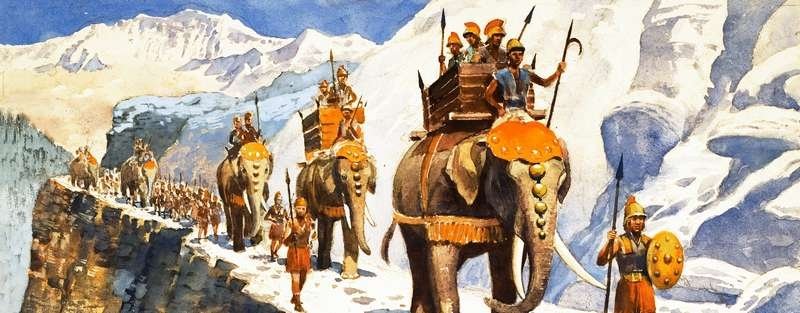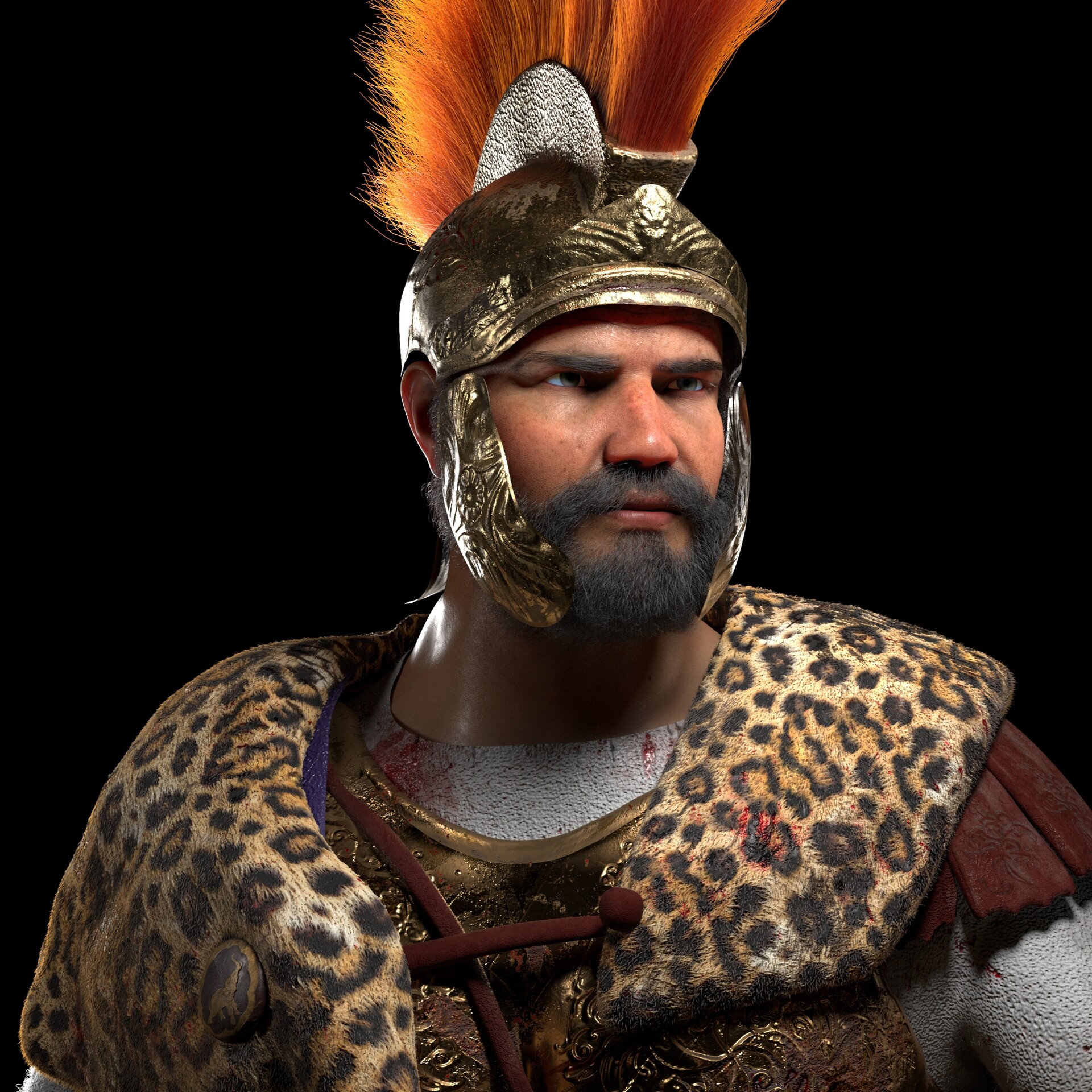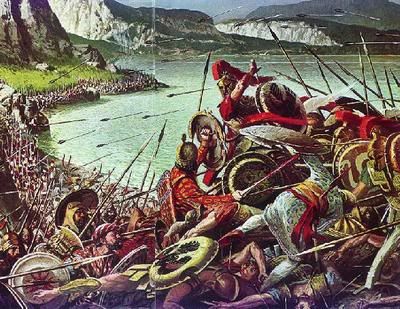The Battle of Insubria in 203 BC was the culmination of a major war, carried out by the Carthaginian commander Mago, brother of Hannibal Barca, at the end of the Second Punic war between Rome and Carthage in what is now northwestern Italy. Mago had landed at Genoa, Liguria, two years before, in an effort to keep the Romans busy to the North and thus hamper indirectly their plans to invade Carthage's hinterland in Africa (modern Tunisia). He was quite successful in reigniting the unrest among various peoples (Ligurians, Gauls, Etruscans) against the Roman dominance.
 |
| Hannibal famously crossing the Alps with elephants |
Rome was forced to concentrate large forces against him which finally resulted in a battle fought in the land of the Insubres (Lombardy). Mago suffered defeat and had to retreat. The strategy to divert the enemy's forces failed as the Roman general Publius Cornelius Scipio laid waste to Africa and wiped out the Carthaginian armies that were sent to destroy the invader. To counter Scipio, the Carthaginian government recalled Mago from Italy (along with his brother Hannibal, who had been in Bruttium until then). However, the remnants of the Carthaginian forces in Cisalpine Gaul continued to harass the Romans for several years after the end of the war.
The Carthaginians invading Rome from the north--which occurred numerous times during the seventeen years of the Second Punic War--seems so improbable. They would have had to to have transported many elephants and tens of thousands of troops over the Strait of Gibraltar, moved north through mountainous Iberia, over a part of the eastern slopes of the Pyrenees, along the coast of southern Gaul, then in a northern direction along the edge of the Alps, then through whatever Alpine passes they could, and finally down into the Po Valley. Apparently they traveled as far east as almost to Lake Garda before turning back west, as the eastern side was Roman territory. All the while maintaining and providing food and water for the elephants, as well as food and water for the troops. Apparently they were well received by the disgruntled Gauls, Ligurians, Insubres, Etruscans, and others. It was almost like a who's who of Rome's enemies in one place. The Carthaginians used the same strategy as the Conquistadors later used in conquering the Aztecs and Incas, in inspiring their enemies' old enemies into action as allies.
 |
| Artwork of Hannibal, although this battle was led by his brother Mago |
On a side note, the elephants were of a now extinct species called the "North African forest elephant," which was much smaller than the tropical African elephant we know of today. They actually gave the elephants large quantities of alcohol to spur them on and to rage in battle! This battle took place near Mediolanum (Milan today), in the land of the Gaulish tribe the Insubes, whch had not yet been conquered by the Romans. Most historians place the number of Carthaginian troops at 21,000, but some believe that the total forces of the Carthaginians and their allies to have been as high as 30,000, with 7 elephants. Mago's brother Hannibal had brought many more over the years in different battles. On the Roman side, there were four legions plus their allies, which was approximately 35,000 troops, and I presume an additional advantage in some heavy state of the art weapons. The Punic War was a lot more than some simple skirmish someplace. It was Rome vs. Carthage, two superpowers! This was the United States vs. the Soviet Union sixty years ago!
The battle in Insubria
In 203 BC, the time came for decisive action. The proconsul M. Cornelius Cethegus and the praetor P. Quintilius Varus led an army of four legions against Mago in a regular battle in the Insubrian land (not far from modern Milan). The description by Livy in his "History of Rome" (Ab urbe condita) shows that each of the opponents deployed their forces in two battle lines. Of the Roman army, two legions were in the front, the other two and the cavalry were left behind. Mago also took care for a possible reverse, keeping in the rear the Gallic levy and the few elephants he had. Some modern estimates put his overall strength at more than 30,000.
The course of the battle showed that the first Carthaginian line performed better and the Gauls were less reliable. From the onset, the Romans made futile attempts to break the enemy's resistance and were pressed hard themselves. Then Varus moved the cavalry (3,000 or 4,000 horsemen), hoping to repulse and confuse the Carthaginian lines. However, Mago was not surprised and moved forward the elephants just in time.
The horses were stricken by fear and as a result the Roman cavalry was
dispersed, chased by Mago's light Numidian cavalry. The elephants turned
on the Roman infantry, which suffered heavy losses. The battle only
took a bad turn for Mago when Cornelius brought into action the legions
of the second line. The elephants were showered upon by darts, with most
of them falling, the rest were forced to turn back against their own
ranks. Mago ordered the Gauls to stop the Roman counter-attack, but they
were routed.
According to Livy, all ended with a general retreating of the Carthaginians, who lost up to 5,000 men. Yet, as Livy himself states, the Romans owed their success to the wounding of the Carthaginian commander, who had to be carried away almost fainting from the field because his thigh was pierced. The victory was neither bloodless, nor complete. The first Roman line lost 2,300 men, and the second also took casualties, among them three military tribunes. The cavalry was not spared either, and many noble Equites were trampled to death by the elephants. During the night Mago withdrew his forces to the Ligurian coast, conceding the battlefield to the Romans.
Carthage was the most powerful rival in Rome's history, which is why the Romans eventually made certain to absolutely flatten Carthage. This wasn't their usual policy. This war lasted so long that it took up a major part of the lives of it's generals. Mago started out in the lower ranks, and distinguished himself during Carthage's defeat of the Romans in the Battle of the Trebia fifteen years earlier, and had become a general by the Battle of Insubria. To put that into perspective, someone forty years old was really considered rather up in years at that time. Also, the Battle of Trepia was the first major battle of the Punic Wars, and it pitted 40,000 Romans vs. 40,000 Carthaginians along the Trebia River, in either Liguria or Emilia.
To lose that major battle, and then to overcome Carthage, displayed the indomitable fighting spirit of the Romans. Carthage could very well have won the war and changed history, in the same manner as if the Soviets had defeated the Americans sixty years ago! Carthage was a Phoenician civilization, so Carthage to Phoenicia at this time would have been the same as what America was to Great Britain two hundred years ago. The Punic Wars were also like World War II, in that the battles were fought in all sorts of different locations and environments.
 |
| 'Temple of Venus and Rome' (artist unknown) |
For Mago the setback was severe, considering what gains a victory would have brought.
The Romans were left in command of the Po Valley and all hopes for a repetition of the events from the beginning of the war faded.
It is certain that for five years after the end of the Second Punic war the Romans had to fight the remnants of the Carthaginian forces in Northern Italy.
Mago's defeat in 203 BC had marked one of the last attempts to preserve the independence of this region from the Roman advance.
.

















